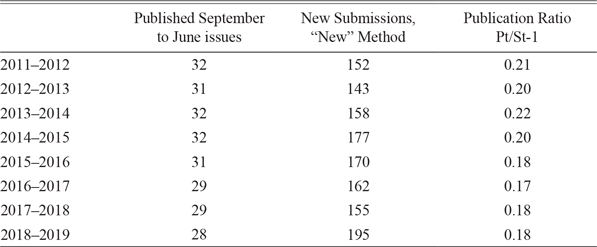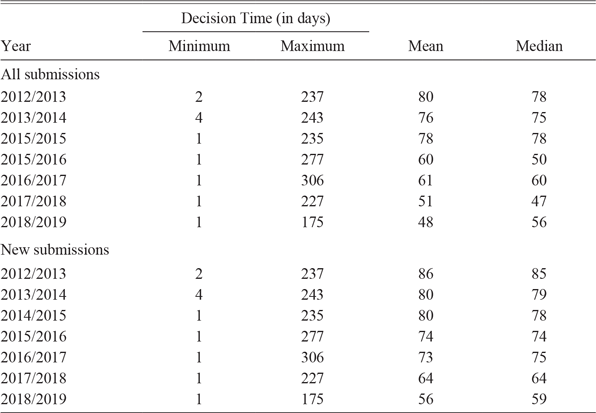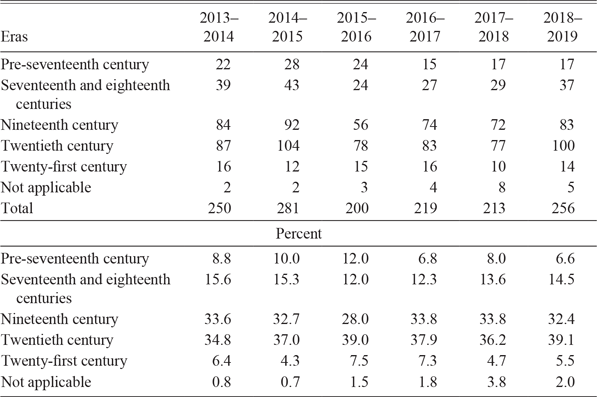Dan Bogart is now in his second year editing the Eurasian submissions to the Journal, and Bill Collins is in his fourth and final year editing the non-Eurasian submissions. Eric Hilt continues his work as book review editor for the Americas, and Aldo Musacchio continues his work as book review editor for the other parts of the world. The Journal is fortunate in having Lily Welch continue as the Journal’s Editorial Assistant and Sally Sztrecska as its Production Editor.
The Journal has benefited greatly from the expert guidance and advice of our Editorial Board and more than 200 referees who contributed their time and expertise to maintaining and enhancing the Journal’s quality. Editorial Board members typically serve four-year terms. Those departing from the Board this year are Guido Alfani, Richard Hornbeck, Morgan Kelly, Noel Maurer, Petra Moser, Aldo Musacchio, Kim Oosterlinck, and Warren Weber. Carola Frydman and Marianne Wanamaker have left the Board to become editors of Explorations in Economic History. Kerstin Enflo has left the Board to become an editor of the European Review of Economic History. New board members include Leticia Arroyo Abad, Eric Hornung, Carl Kitchens, Jared Rubin, Mohamed Saleh, and Laura Salisbury. We also recognize and appreciate numerous scholars’ contributions to the Journal’s book reviews. The editorial office is grateful to all who have worked on behalf of the Journal over this past year.
The number of new submissions to the Journal in recent years is shown in Table 1. Over the last several years, the average number of submissions per year is approximately 160, but in the past year there was a noticeable jump in the number of submissions. Time will tell whether this is an aberration or a new level for the inflow of submissions. The publication ratio displayed in Table 1 is the number of refereed papers and notes published in the current year divided by the number of new manuscripts submitted in the previous year. In 2018–2019, the publication ratio was 0.18 (28/155), which is in line with the recent past. The Journal published 30 articles in total in 2018–2019, including Cormac Ó Gráda’s presidential address and Kevin O’Rourke’s “reviews and reflections” essay.
Table 1 SUBMISSION AND PUBLICATION RATES

The “published” count includes refereed articles and notes. It does not include the presidential address, which is published in June, nor does it include “reviews and reflections” articles. In 2017–2018, the Journal published one “reviews and reflections” article.
Table 2 reports the response-time statistics for the corresponding sample. To place the numbers into context, our goal is to have a decision back to the author within 90 days. This past year’s performance has been somewhat faster than previous years for new submissions, with a median response time of just under 60 days. Note that this pertains to submissions received from July 2018 to June 2019, some of which may not have received decisions at the time of this report’s writing. The median response time for all submissions (included revised manuscripts) is slightly lower. Unfortunately, a small number of papers have taken longer to review. We apologize to authors of manuscripts that experienced substantial delays. We continuously work to reduce the time for this small number of manuscripts, taking into consideration that we are, of course, concerned about the quality of the response, not only its speed.
Table 2 RESPONSE TIME STATISTICS

The distributions of submissions are documented in subsequent tables. We show the data for eras in Table 3 and for topics in Table 4. The automated part of the paper submission system stopped collecting information on regions for a period of time during 2015 and 2016. This means that we do not have consistent comparisons over all years in the table. What is currently available is shown in Table 5.
Table 3 DISTRIBUTION OF SUBMISSIONS BY ERA, MULTIPLE SELECTIONS PER SUBMISSION POSSIBLE

Note: This table corrects errors in previous year’s report for 2014–2015 pre-seventeenth-century percent entry and for 2015–2016 twentieth-century percent entry.
Table 4 DISTRIBUTION OF SUBMISSIONS BY TOPIC, MULTIPLE SELECTIONS PER SUBMISSION POSSIBLE

Note: This table corrects errors in previous years’ reports for 2014–2015 and 2015–2016 percent entries.
Table 5 DISTRIBUTION OF GEOGRAPHICAL AREA

* 2014–2015 Region data are from 1 July 2014–14 October 2015. 2015–2016 Region data are from 18 March 2016–30 June 2016.
The Journal’s coverage remains broad. Table 3 shows that the distribution of submissions over eras has been fairly steady in recent years, with the nineteenth and twentieth centuries accounting for the bulk of submissions. Table 4 shows that submissions in political economy, labor, and growth continue to be particularly strong. Nonetheless, the top-three topic areas together account for less than half of all submissions, reflecting broadly dispersed interests within the field. Table 5 shows that submissions on Western Europe and the United States are most common. In the past year, there was a dip in the share of submissions on Asia and a slight rise in the share of submissions on Africa, Eastern Europe/Russia, and Latin America.
Book reviews are an important component of the Journal, and we sincerely thank the many reviewers. We also remind our membership to have their press send a copy of any new books to the relevant book review editor. In recent years, the Journal has also sought occasional “reviews and reflections” synthetic articles, extended book reviews, and roundtable book reviews when appropriate. For instance, in June 2019, the Journal published “Economic History and Contemporary Challenges to Globalization,” a “reviews and reflections” article by Kevin O’Rourke.
Readers will recall that at the 2013 meetings, the EHA board of trustees approved a policy to make publication conditional on archiving the data sufficient to replicate the results in the accepted articles. The authors of all new submissions from 1 January 2016 onward that were accepted for publication have been required to post data and replication files to maintain and advance the Journal’s efforts to ensure transparency and scholarly integrity. A branded page can be found with openICPSR, and depositors can submit files into openICPSR per the instructions available at: http://www.icpsr.umich.edu/files/openICPSR/JEH-deposit-instructions.pdf. The editorial office and ICPSR continue to work to enhance the interface.
Referees for 2018 were:
Brian A’Hearn
Olivier Accominotti
Scott Adler
Toke Aidt
Guido Alfani
Bob Allen
Marcella Alsan
Lee J. Alston
Belinda Archibong
Leticia Arroyo Abad
Vellore Arthi
Cihan Artunç
Jeremy Atack
Richard Baker
Gerben Bakker
Charlotte Bartels
Brian Beach
Sascha O. Becker
Thor Berger
Asaf Bernstein
Vincent Bignon
Matthias Blum
Gustavo Bobonis
Leah Boustan
Stephen Broadberry
John Brown
Gillian Brunet
Liam Brunt
Carsten Burhop
Joyce Burnette
Edmund Cannon
Ann Carlos
Celeste Carruthers
Federica Carugati
Benjamin Chabot
Christophe Chamley
Eric Chaney
Latika Chaudhary
David Chilosi
Dylan Connor
Gary Cox
Neil Cummins
Tomas Cvrcek
John Dalton
Aditya Dasgupta
Joseph Davis
Charles de Bartolome
Alan de Bromhead
Mark Dincecco
Jordi Domenech
Mauricio Drelichman
Martin Dribe
Nicolas Duquette
Andrew Dustan
Alan Dye
Shari Eli
Kerstin Enflo
Steven A. Epstein
Katherine Eriksson
José-Antonio Espín-Sánchez
Giovanni Federico
James Feigenbaum
Alan Fernihough
Daniel Fetter
Price Fishback
Martin Fiszbein
Marc Flandreau
Erin Fletcher
Caroline Fohlin
Nathan Foley-Fisher
Johan Fourie
Ewout Frankema
Carola Frydman
Dustin Frye
Leigh Gardner
Thomas Gehrig
Oscar Gelderblom
Michela Giorcelli
Sun Go
Regina Grafe
Rowena Gray
Farley Grubb
Timothy Guinnane
Bishnupriya Gupta
Federico Gutierrez
Michael Haines
Walker Hanlon
Leslie Hannah
Timothy Hatton
Joshua Hausman
Ron Hayduk
Thomas Heinrich
Morgan Henderson
Carlos Eduardo Hernández
Alfonso Herranz-Loncán
Eric Hilt
Philip Hoffman
Richard Hornbeck
Erik Hornung
Anton Howes
Jane Humphries
Kris Inwood
Douglas Irwin
Murat Iyigun
David Jacks
Matthew Jaremski
Taylor Jaworski
Saumitra Jha
Ruixue Jia
Reka Juhasz
Brooks Kaiser
Shawn Kantor
Daniel Kaufmann
Ian Keay
Morgan Kelly
Lionel Kesztenbaum
Carl Kitchens
Alexander Klein
John Komlos
Mark Koyama
Sumner La Croix
José Miguel Lana-Berasain
Marc Law
Sibylle Lehmann-Hasemeyer
Frank Lewis
Dan Li
Gary Libecap
Peter Lindert
Trevon Logan
Paul-Vincent Lombardi
Jason Long
Sara Lowes
Debin Ma
Brian Marein
Robert Margo
Catherine Massey
Kate Masur
Noel Maurer
Christopher Meissner
Keith Meyers
Melinda Miller
Chris Minns
Paul Miranti
Rinchan Mirza
Salvatore Morelli
Petra Moser
Charles Moul
Tomas Murphy
Peter Murrell
Aldo Musacchio
Steven Nafziger
Larry Neal
Tom Nicholas
Greg Niemesh
Sergey Nigai
Pilar Nogues-Marco
Johannes Norling
Alessandro Nuvolari
Cormac Ó Gráda
Sheilagh Ogilvie
Kim Oosterlinck
Nuno Palma
Craig Palsson
Sevket Pamuk
Andrea Papadia
John Parman
Helen Paul
Santiago Pérez
Alexander Persaud
Maarten Prak
Jonathan Pritchett
Sarah Reber
Angela Redish
Claudia Rei
Paul Rhode
Gary Richardson
Albrecht Ritschl
Hugh Rockoff
Jonathan Rose
Joshua Rosenbloom
Jean-Laurent Rosenthal
Elyce J. Rotella
Jared Rubin
Martin Saavedra
Mohamed Saleh
Laura Salisbury
Eric Schneider
Max-Stephan Schulze
Andrew Seltzer
Edson Severnini
Paul Sharp
Allison Shertzer
Katharine Shester
Carol Shiue
Pablo Sierra Silva
Peter Siminski
James Siodla
Carolyn Sissoko
Peter Solar
Rohini Somanathan
Arthur Spirling
Steven Sprick Schuster
Bjarne Strøm
David Stuckler
Nathan Sussman
Richard Sutch
Anand Swamy
Hui Ren Tan
John Tang
Peter Temin
Melissa Thomasson
Werner Troesken
John Turner
Stefano Ugolini
Marlous van Waijenburg
Jan Luiten Van Zanden
Jessica Vechbanyongratana
François Velde
Jordi Vidal-Robert
Tamas Vonyo
Daniel Waldenström
Patrick Wallis
Marianne Wanamaker
Kirsten Wandschneider
Zachary Ward
Warren Weber
Marc Weidenmier
Leonardo Weller
Alex Whalley
Eugene White
Gavin Wright
Yishay Yafeh
Noam Yuchtman
Shuang Zhang
Nicolas Ziebarth
Ariell Zimran









